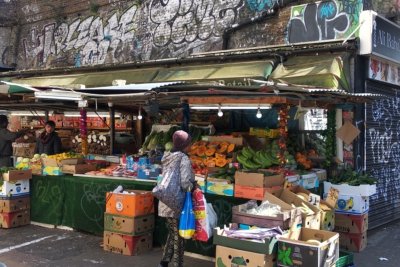Food can be at the heart of policies to build community wealth and create resilient local economies.
Growing, producing and buying food presents opportunities to build resources, wealth and resilience in local communities, and to balance power more evenly across the supply chain. Resources can include jobs, skills, capital and natural assets like soil, water, fish, and ecosystem services. Food production or farming methods which degrade our natural environment undermine the opportunities for, and resilience of, communities.
For these reasons, an equitable and meaningful definition of local food should consider both where food is produced and how it is produced. It should prioritise business practices that share power and wealth more equally, and ensure that local communities growing and producing food experience a fairer and more sustainable food system.
How to do this in practice:
Supporting local food doesn’t necessarily mean buying what is produced closest to you, but sourcing in a way which builds wealth, power and resources within communities which can include:
-
Creating opportunities that benefit the community and its workers, such as using cooperative or social enterprise business models. For instance, the Mayor of New York City offers business benefits worth $10,000 to businesses wishing to become employee-owned.
-
Buying from independent business like real bread bakeries (which produce more jobs per loaf than industrial manufacturers).
-
Sourcing food produced agroecologically and organically through farmer-focussed supply chains, which allow nature to thrive, support productive natural ecosystems and pay farmers a fair price for their produce.
-
Choosing Fairtrade products which guarantee a fair price for producers, invest money in producer communities, and have high environmental standards.
-
Support and make space for market stalls, farmers markets, and alternative retail options like box schemes and farm shops.
Local authorities, educational institutions, local economic partnerships and others operating at a local policy level can support these principles in their decision making:
-
Use buying and dynamic procurement contracts to demonstrate community wealth building by purchasing sustainably-produced food from smaller-scale producers, while paying the living wage.
-
Business support including rate discounts, mentoring, and promotion through council channels
-
Preferential access to land or property, using planning policy to protect spaces where local food enterprises thrive.
-
Invest in the infrastructure that supports sustainable food production and primary processing in the local area.
-
Support a diverse food system which ensures culturally-appropriate food is available to all communities.
Sustain’s report; How councils can support good food enterprises: findings from London presents a suite of ideas for how councils can build a fairer, more inclusive, healthier, sustainable, and prosperous economy after Covid-19 by supporting good food enterprises.
Why it's important
Using food to build local power and economic opportunity can bring a number of benefits:
Climate and nature
Industrial farming and fishing are major threats to our climate and ecosystems. Transitioning away from this approach and towards agroecological farming systems can deliver considerable climate benefits:
Reduced emissions from refrigerated transport, storage, and in-store refrigeration for fruit and vegetables: The complex storage and distribution phase of large retailer supply chains adds 4 - 45% (depending on the product) to the climate emissions of UK vegetables, are three times higher than the emissions from the distribution phase for a small-scale box scheme.
Research has shown that agroecological farming (such as organic, agroforestry and pasture-based systems) is better for climate mitigation and adapation, nature recovery, and has positive food security and nutrition benefits.
Reduce waste: The long supply chain model for fresh produce generates a high percentage of post-farm loss, estimated at between 3 and 10% from over-ordering, grading, storing and packing loss. Research from food waste charity Feedback suggests that overall waste, linked to supermarket demands, causes overproduction between 10-16%.
Tackling food insecurity oversees: A recent study highlighted that the UK imports much of its fruit and veg from climate stressed countries, and unless it is produced with fairtrade principles, it is likely to be produced by workers paid significantly less than a living wage; a business model which is driving inequality and creating food insecurity for these communities.
For more information about how councils can reduce their food-related greenhouse gas emissions, see our toolkit, the Every Mouthful Counts report, or the Quick Guide for Councils.
Food security
During the Covid-19 pandemic, small-scale farming has not experienced the same urgent staff shortages as larger farms, as they provide decent and year-round jobs compatible with family life. Investment in local businesses would make our food system more resilient to future shocks.
During the first covid-19 lockdown, food was wasted and milk was poured down the drain, as people shifted their buying habits and supply chains could not adapt. Sustain found that with the right support, smaller businesses were able to adapt to lockdown quickly and minimise waste, retain jobs and their trading connections with farmers.
Good jobs
There is clear evidence that diverting spend to localised food systems, with shorter supply chains, offers decent jobs, keeps food in the local economy and produces food efficiently.
Urban vegetable market. Credit: Ruth Westcott
Climate Change and Nature: Sustain has taken a keen interest in the rapidly accumulating evidence about the effect of food and farming on climate change and nature, as scientific evidence emerges that our food system is a very significant contributor to greenhouse gas emissions and biodiversity loss.
